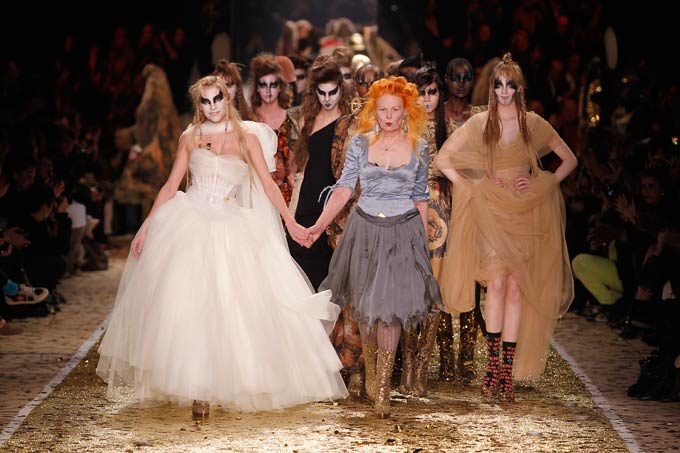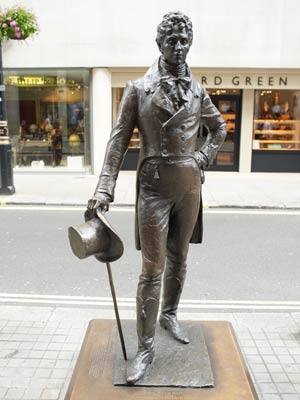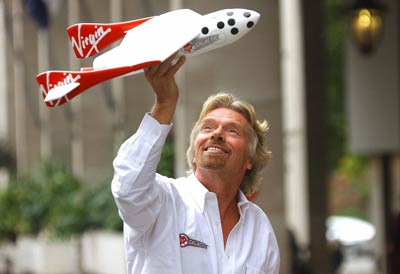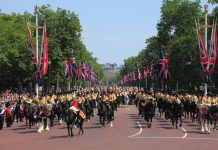“If people did not dare to be different, the world would be a much more boring place,” says author David McKie. Brits are known for embracing quirkiness. Throughout history, from politicians to poets, daring to be different comes naturally to the great British eccentric.

One trait often associated with the British is a propensity for extreme eccentricity. The term ‘eccentric’ encompasses all manner of affectations, whims and peculiar habits. British journalist and historian David McKie, who has gathered together many memorable misfits in his book Bright Particular Stars, says that people often get the definition of an eccentric wrong. “People tend to think that ‘eccentric’ means unusually weird and wacky,” he observes. “That’s not the real definition: the word is derived from Latin and simply means ‘away from the centre,’ away from what we think of as normal, ordinary.”
Britain has produced more than its fair share of eccentric characters throughout history. Some of the greatest have helped shape the very essence of Britishness, contributing to what we now embrace as our national identity. In every field, from politics to physics and fashion to food, true talent is often synonymous with more than a touch of madness. While inventing the telephone, for example, Scotland-born inventor Alexander Graham Bell tried to teach his dog to talk, and renowned genius Sir Isaac Newton is said to have stuck a large darning needle into his eye socket and twiddled it around – just to see what would happen, presumably.

In Britain, individuality, quirkiness and oddity are seen as traits to be valued and our eccentrics are generally regarded with affection if not all-out admiration. Indeed, a considerable number of history’s most brilliant minds have displayed some peculiar patterns of behaviour and habits. As the British philosopher John Stuart Mill wrote in On Liberty in 1859, “That so few now dare to be eccentric, marks the chief danger of the time… They are the visionaries who make giant imaginative leaps.”
Some of Britain’s best-known eccentrics are easy to spot; they have carved out iconic identities for themselves specifically by creating a certain image and taking styling and fashion to a whole new level. Take Beau Brummel, who managed to lord it over his contemporaries in class-bound Regency London purely through a masquerade of style superiority. For him, image was everything and he claimed to take five hours to dress, recommending that boots be polished with champagne. He developed a profligate style that got him noticed in all the right places and fostered a following of admirers – including the Prince Regent, the future King George IV.
McKie is convinced that “the true eccentric acts as he or she does because that is their nature.” However, “there are people who, to get themselves noticed, accentuate their eccentricities. I call them ‘confected’ eccentrics. They are not to be trusted.”
Isabella Blow is another eccentric who has created a memorable name for herself, and hers is a fashion mantle that has influenced many. Her outfits were almost always accessorised with flamboyant Philip Treacy headwear, fashioned to look like crocodiles’ teeth, lobsters and flying saucers, to name just a few, which she ascribed to the ‘vampiric’ nature of fashion. “I wear the hats to keep everyone away from me,” she revealed.
Just as outspoken as Blow, Dame Vivienne Westwood is another eccentric fashionista who really speaks her mind. The British designer has had a long and successful career, characterised mainly by her disregard of trends or the establishment. She created both an uproar and a devoted following with her anti-establishment punk fashion designs in the 70s, but has since done an about-turn and embraced all things British, including the Royals. Now aged 70, she still rebels against the status quo, famously going knickerless when collecting her OBE from the Queen at Buckingham Palace. As she herself says, “Life is rich and cruel and we, the lucky ones, are having a great adventure.”
And her rebellion hasn’t just stuck to fashion. “I always hijack my fashion shows to talk about culture and politics,” she admits, and she is known in particular for her crusades against climate change. Adeptly, Westwood realises that her celebrity and eccentricity mean she can reach a wider audience. “Your opinions influence others to change – to open their eyes and see things differently,” she says.

Perhaps the British are particularly prone to and proud of eccentricity because, as an island nation, we like to feel a little cut off from the mainstream. “Like so much else in our traditions and culture, we take special pleasure and pride in diversity,” agrees McKie. But while the island-bound British public might cherish some eccentrics, not all achieved this tolerant affection straight away.
The poet and painter William Blake, for example, had to contend with most of his contemporaries thinking he was simply mad. Mind you, his ideas were rather radical. He liked to act out his artistic inspirations and would make his wife sit naked in the garden with him reading Paradise Lost out loud.
Like many other eccentrics, Blake seemed to live in his own private world. He was not content to settle to one area of expertise, and became a painter, poet, engraver and philosopher, developing his own idiosyncratic views, delusions and contradictions. Shirley Dent, co-author of Blake biography Radical Blake, comments on his famous lyrics to the hymn Jerusalem: “It is both a reactionary and radical poem. He means many things to many people. There is something in the poetry itself that is contradictory.”
Blake wasn’t the only lovable oddball. Take Alan Turing, who is now acknowledged to be among the greatest British inventors. His Turing machine is said to be the basis for the modern computer. Turing also worked at the now-famous government code-breaking headquarters, Bletchley Park, and played a vital role in deciphering German ciphers during the outbreak of war in 1939. He became a well-known figure there, both for his genius and his eccentricities. He was occasionally known to run the 40 miles to London when he was needed for high-level meetings, and, suffering from hayfever, he would cycle to the office wearing a service gas mask to keep the pollen off.
To be subversive isn’t the raison d’être of the eccentric, but it’s often a by-product, and one that can change popular opinion for the better. David McKie says, “I think the best of [the eccentrics] have a great influence for good simply because they think in different patterns from the rest of us. We run to some extent on tramlines; they veer all over the road.”
Many of our most famous and successful public figures arguably fall into the eccentric category – look at Britain’s most famous businessman, Sir Richard Branson, for example. As a business tycoon and CEO (or Chief Eccentric Officer) of Virgin, he considers publicity the best branding strategy. In fact, few business leaders have gone to such extremes to become synonymous with their brand.

“As far as I am concerned,” Branson writes in his autobiography, “anything, however outlandish, that generates media coverage, reinforces my image as a risk-taker who challenges the establishment.”
While he’s happy to send himself up, playing the barmy billionaire on a number of TV shows including the US show Friends, Branson also uses his eccentricity to publicise his causes. That’s not to say he’s one of McKie’s ‘confected’ eccentrics – bizarre behaviour is surely a part of his nature – but he has the money and influence to provoke maximum fanfare for the issues he champions.
David McKie recalls an interview he did with ex-Conservative MP Anne Widdecombe: “The first question [I asked] her was: ‘do you think you are eccentric?’ ‘Certainly not,’ she said; ‘it’s other people who are eccentric.’ But I think in reality eccentric people know they are eccentric and simply don’t care; indeed [they] are proud of it. The light would go out of their lives if they began to behave ‘normally.’”
This sums up Branson and all the other beloved British eccentrics rather nicely; we British are quietly proud to lead the world in producing some serious oddballs, but they themselves are proudest of all.
Related articlesFathers of invention |
Click here to subscribe! |





 © 2024
© 2024